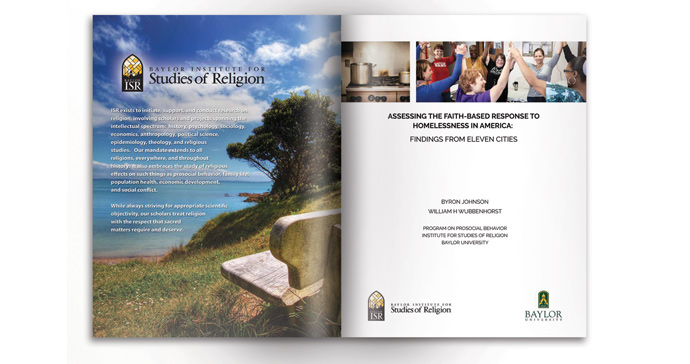Faith-based Organizations Shoulder Majority of Crucial Services and Develop Creative Solutions for Homelessness

Faith-based organizations are at the forefront of addressing root causes of homelessness, providing the majority of emergency shelter beds and innovating long-term solutions, a new study by Baylor’s Institute for Studies of Religion (ISR) concludes.
Released Feb. 1 at the National Press
Club in Washington, D.C., the study looked at homelessness in 11 sample cities and is part of a growing body of independent research examining the socio-economic impact of faith-based organizations across the United States.
“The data in this study sheds light on the largely overlooked, significant role of the multi-faith sector in addressing the homelessness challenge in urban and rural communities and doing so in innovative ways,” Dr. Byron R. Johnson, distinguished professor of social sciences and director of ISR, said. “This research is helpful because it reveals the mainly untold story of the socio-economic impact of faith-based organizations on the common good health and flourishing of
whole communities.”
According to the study, faith-based organizations provide 58 percent of emergency shelter beds in the 11 cities surveyed across the nation, in addition to providing an array of vital services and personalized interventions necessary for long-term recovery and independence. These services include education, healthcare, job training and addiction recovery.
As a result, the study estimates that faith-based organizations create $9.42 in taxpayer savings for every $1 invested by the government. It further shows an estimated $119 million in tax savings in the 11 cities during the three years following implementation of faith-based Residential Recovery and Job Readiness programs.
According to the Baylor study, Residential Recovery and Job Readiness programs are areas where faith-based organizations are “at the forefront of program innovation and organizational transformation for improving positive outcomes for the homeless individuals and families.”
“In most cases, people become homeless due to a range of complex personal and societal factors, not just because they cannot afford a home,” Johnson said. “Our conclusions demonstrate that faith-based organizations are in a unique position to treat the systemic issues that create homelessness to develop sustainable solutions for both individuals and municipalities.”
The research also illuminates how collaboration among faith-based, community groups, private industry and local, state and federal government agencies creates the strongest responses to homelessness and its underlying issues.
“As the mayor of Indianapolis, I worked hand-in-hand with faith-based organizations to provide services to those experiencing homelessness,” former Indianapolis mayor Greg Ballard said. “This study takes an important step toward illuminating the magnitude of these organizations’ social and economic contributions to communities around the country.”
For the project, Johnson and co-author William Wubbenhorst collected data and interviewed individuals in both faith- and non-faith-based organizations across the country during 2016. The goal was to better understand how homelessness has increased or decreased in 11 diverse cities around the country, quantify faith-based organizations’ interventions in homelessness and related issues, and estimate taxpayer savings associated with Residential Recovery and Job Readiness programs.
Launched in August 2004, ISR exists to initiate, support and conduct research on religion, involving scholars and projects spanning the intellectual spectrum: history, psychology, sociology, economics, anthropology, political science, epidemiology, theology and religious studies. The ISR’s mandate extends to all religions, everywhere, and throughout history, and embraces the study of religious effects on prosocial behavior, family life, population health, economic development and social conflict.
For more information, visit baylorisr.org.